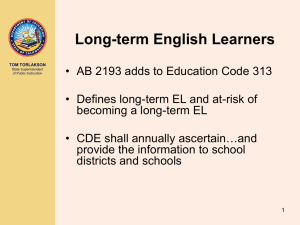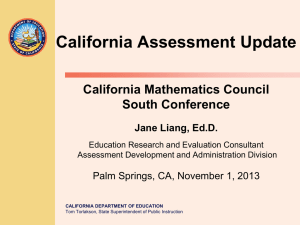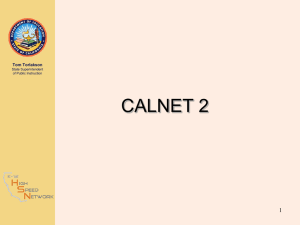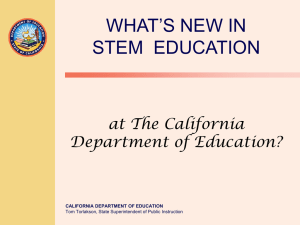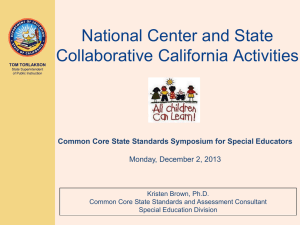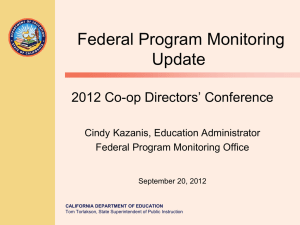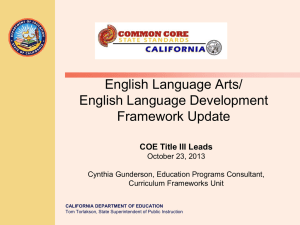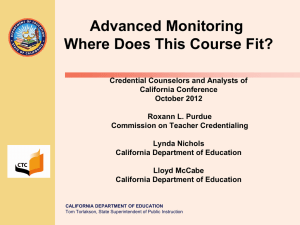CII Presentation Feb. 8, 2013 Rvsd.
advertisement
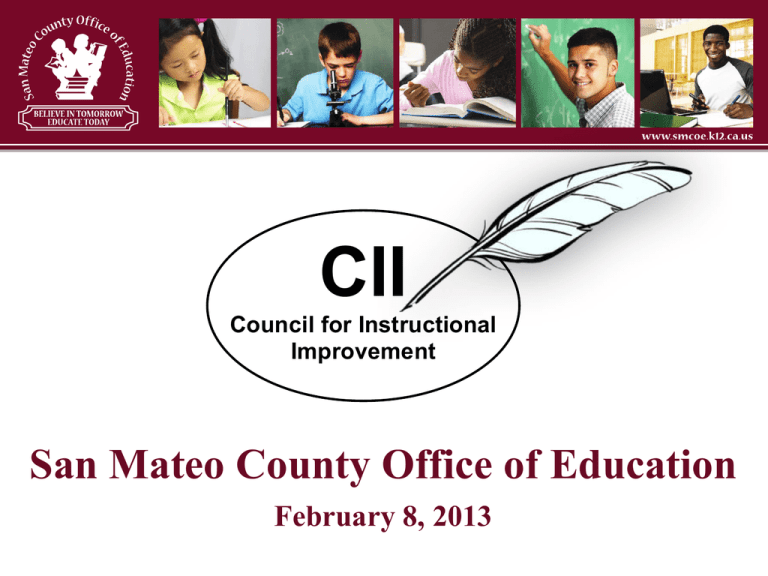
CII Council for Instructional Improvement San Mateo County Office of Education February 8, 2013 Welcome and Overview of Agenda Lori Musso, Administrator Curriculum and Instruction Services AGENDA 8:30 WELCOME AND OVERVIEW OF AGENDA 8:35 STATE AND FEDERAL UPDATES 8:50 SSPI RECOMMENDATIONS FOR TRANSITIONING CALIFORNIA TO A FUTURE ASSESSMENT SYSTEM 9: 50 ASSESSMENT QUESTION & ANSWER SESSION 10:20 BREAK 10:35 ASSESSMENT AND ACCOUNTABILITY UPDATES 10:55 ASSESSMENT: IMPLICATIONS FOR INSTRUCTION 11:25 ANNOUNCEMENTS 11:30 ADJOURN STATE AND FEDERAL UPDATES Lori Musso, Administrator Curriculum and Instruction Services Assessment Update & SSPI Recommendations for Transitioning California to a Future Assessment System San Mateo County Office of Education February 8, 2013 Patrick Traynor, Ph.D. Director, Assessment Development and Administration Division California Department of Education CALIFORNIA DEPARTMENT OF EDUCATION Tom Torlakson, State Superintendent of Public Instruction Presentation Overview TOM TORLAKSON State Superintendent of Public Instruction • CCSS Update • Smarter Balanced assessment update – – – – SBAC Review Sample items Pilot test Achievement level descriptors • Superintendent’s recommendations for a future assessment system 6 English Language Arts and Mathematics, Grades 3–8 and High School BEGINNING OF YEAR END OF YEAR TOM TORLAKSON Last 12 weeks of year* State Superintendent of Public Instruction DIGITAL CLEARINGHOUSE of formative tools, processes and exemplars; released items and tasks; model curriculum units; educator training; professional development tools and resources; scorer training modules; and teacher collaboration tools. Formative Assessments INTERIM ASSESSMENT Computer Adaptive Assessment and Performance Tasks INTERIM ASSESSMENT Computer Adaptive Assessment and Performance Tasks PERFORMANCE TASKS • Reading • Writing • Math Scope, sequence, number, and timing of interim assessments locally determined Optional Interim assessment system— END OF YEAR ADAPTIVE ASSESSMENT Re-take option Summative assessment for accountability * Time windows may be adjusted based on results from the research agenda and final implementation decisions. 7 Source: http://www.ets.org Computer Adaptive Testing TOM TORLAKSON State Superintendent of Public Instruction 8 Smarter Balanced Draft Achievement Level Descriptors (ALDs) TOM TORLAKSON State Superintendent of Public Instruction • A full description of the ALDs and an online survey for providing feedback are available on the Smarter Balanced achievement level descriptors Web page at http://www.smarterbalanced.org/achievementlevel-descriptors-and-college-readiness/ • Not finalized yet (March 2013) • Describe four levels of achievement of knowledge, skills, and processes in both English–language arts/literacy and mathematics – “deep command,” “sufficient command,” “partial command,” or “minimal command” – Currently: "thorough," "adequate," "partial," and "minimal" 9 SBAC Spring 2013 Pilot Test • Two components for school participation: TOM TORLAKSON State Superintendent of Public Instruction 1) Scientific 2) Volunteer • There will be no scores or individual student data associated with either component. • The pilot test is untimed but depending on the grade, content area, and types of items administered, test times are expected to range from 2 to 3 hours of student testing time for either component. 10 SBAC Spring 2013 Pilot Test – Scientific Component TOM TORLAKSON State Superintendent of Public Instruction • A representative sample of schools selected by SBAC to yield critical data about the items developed to date, as well as how the system is functioning. • Testing window is February 20 through May 10, 2013. Selected schools will be assigned a 2-week period within the this window. • To search for selected California schools by county and district visit the CDE SBAC Web page at http://www.cde.ca.gov/ta/tg/sa/smarterbalanced.asp – select the “Spring 2013 Pilot Test” hyperlink. 11 SBAC Spring 2013 Pilot Test – Scientific Component TOM TORLAKSON State Superintendent of Public Instruction • Grade level and content area to be assessed are predetermined as part of the sampling plan. • Training for scientific pilot test schools will include training modules and live webinars. • Training dates and times will be advertised soon. 12 SBAC Spring 2013 Pilot Test – Scientific Component TOM TORLAKSON State Superintendent of Public Instruction • Participation is not mandatory but is strongly recommended. • Selected schools will inform future item development and test design. • Opportunity for schools to tryout the online system and for students to interact with the new innovative item types. • SBAC is currently contacting selected schools to confirm participation. Selected schools that cannot participate should contact Data Recognition Corporation (DRC). 13 SBAC Spring 2013 Pilot Test – Volunteer Component TOM TORLAKSON State Superintendent of Public Instruction • Open to all schools in SBAC states. • Testing window is April 9 through May 10, 2013. • Schools can participate any time during the volunteer testing window. • Schools may volunteer by completing the volunteer survey at https://www.surveymonkey.com/s/SmarterBalancedPilot. 14 SBAC Spring 2013 Pilot Test – Volunteer Component TOM TORLAKSON State Superintendent of Public Instruction • Training modules and webinars for the volunteer schools will be posted on the SBAC Web portal at http://sbac.portal.airast.org/. • Volunteer schools can access modules and webinars at their convenience. • There will be no live pilot test training opportunities. 15 SBAC Spring 2013 Pilot Test – Volunteer Component TOM TORLAKSON State Superintendent of Public Instruction Incentives for participating in the volunteer component: • Chance for schools to tryout the online administration system. • Opportunity for students interact with the new innovative item types. • Choice of grade(s) and content area(s) tested. 16 SBAC Spring 2013 Pilot Test – Contacts and Information TOM TORLAKSON State Superintendent of Public Instruction Recruitment Information Data Recognition Corporation 800-847-3193 smarterbalancedrecruitment@datarecognitioncorp.com All Other Information American Institutes for Research 866-815-7246 smarterbalancedhelpdesk@air.org SBAC Pilot Test Frequently Asked Questions: http://www.cde.ca.gov/ta/tg/sa/smarterbalanced.asp – select the “Spring 2013 Pilot Test” hyperlink 17 SBAC Sample Items and Tasks TOM TORLAKSON State Superintendent of Public Instruction http://www.smarterbalanced.org/sample-items-and-performance-tasks/ 18 Sample Items and Tasks Navigation View mathematics or ELA/literacy items Advance to next item, or go back to previous Page 19 Sample Items and Tasks Navigation Content Claim Grade band Page 20 Sample Items and Tasks Navigation Filter by item type, themes Page 21 Item Metadata About this item Page 22 Exploring the Sample Items Selected response and technology enhanced items are machine scorable Page 23 Assessments to Consider (by content area and grade level) TOM TORLAKSON State Superintendent of Public Instruction 24 TOM TORLAKSON State Superintendent of Public Instruction SSPI Recommendations for Transitioning California to a Future Assessment System • California EC Section 60604.5 required the SSPI to provide the Legislature with recommendations for the reauthorization of the statewide pupil assessment program. • In forming recommendations, the SSPI was required to consult with certain stakeholder groups and consider the inclusion of 16 specific features in the assessment system. 25 TOM TORLAKSON SSPI Recommendations for Transitioning California to a Future Assessment System State Superintendent of Public Instruction • A report containing the SSPI’s recommendations was delivered to the Legislature on January 8, 2013. • The report includes: – an overview of the current statewide assessment system – current transition efforts – a summary of stakeholder feedback – 12 recommendations for the transition to a new assessment system 26 Setting the Foundation TOM TORLAKSON State Superintendent of Public Instruction • Recognize assessment is an integral part of a cycle of standards, curriculum, and instruction. • Recommend a system that promotes and models high quality teaching and learning. • Consider the input of thousands of stakeholders including students, parents, teachers, administrators, business leaders, and community leaders. • Consider the role the state should play in the assessment system and the value of local control. • Recognize the current fiscal climate but also 27 the investment opportunity. SSPI Recommendation 1 TOM TORLAKSON State Superintendent of Public Instruction Beginning in the 2013-14 school year, suspend portions of the STAR Program assessments and adjust the API to reflect suspension of such assessments. 28 SSPI Recommendation 2 TOM TORLAKSON State Superintendent of Public Instruction Beginning in the 2014-15 school year, fully implement the SBAC ELA and mathematics assessments. 29 SSPI Recommendation 3 TOM TORLAKSON State Superintendent of Public Instruction Use the grade eleven SBAC ELA and mathematics assessments as an indicator of college readiness. 30 SSPI Recommendation 4 TOM TORLAKSON State Superintendent of Public Instruction Develop and administer science assessments aligned to the new science standards, once adopted. 31 SSPI Recommendation 5 TOM TORLAKSON State Superintendent of Public Instruction Develop or use multistate consortia alternate assessments in ELA, mathematics, and science for students with severe cognitive disabilities. 32 SSPI Recommendation 6 TOM TORLAKSON State Superintendent of Public Instruction Determine the continued need and purpose of academic assessments in languages other than English once the SBAC assessments are operational. 33 SSPI Recommendation 7 TOM TORLAKSON State Superintendent of Public Instruction Assess the full curriculum using assessments that model high-quality teaching and learning activities. 34 SSPI Recommendation 8 TOM TORLAKSON State Superintendent of Public Instruction Invest in interim, diagnostic, and formative tools. 35 SSPI Recommendation 9 TOM TORLAKSON State Superintendent of Public Instruction Consider alternatives to the current California High School Exit Examination. 36 SSPI Recommendation 10 TOM TORLAKSON State Superintendent of Public Instruction Explore the possible use of matriculation examinations. 37 SSPI Recommendation 11 TOM TORLAKSON State Superintendent of Public Instruction Conduct comparability studies. 38 SSPI Recommendation 12 TOM TORLAKSON State Superintendent of Public Instruction Maintain a continuous cycle of improvement of the assessment system. 39 Contact Information TOM TORLAKSON State Superintendent of Public Instruction • Patrick Traynor, PhD, Director Assessment Development and Administration Division – E-mail: ptraynor@cde.ca.gov • Jessica Valdez, Administrator, Transition Office Assessment Development and Administration Division – Phone: 916-319-0332 – E-mail: jvaldez@cde.ca.gov • Dixie Abbot, SBAC Teacher Involvement Coordinator, CDE Transition Office Assessment Development and Administration Division – Phone: 916-445-4821 – E-mail: dabbot@cde.ca.gov 40 ASSESSMENT - Q&A SESSION Patrick Traynor, Ph.D. Director, Assessment Development and Administration Division California Department of Education B R E A K ASSESSMENT AND ACCOUNTABILITY UPDATES Mefula Fairley, Director Compliance, Assessment and Special Projects SBAC Updates • Pilot Testing • Technology Readiness Tool • Preliminary Blueprints 44 SBAC Pilot Test • School Participation Scientific Component Volunteer Component • Scores and Data • Testing Time for Students 45 SBAC Pilot Test Contacts and Information Recruitment Information Data Recognition Corporation (DRC) 800.847.3193 SmarterBalancedRecruitment@DataRecognitionCorp.com All Other Questions American Institutes for Research (AIR) 866.815.7246 SmarterBalancedHelpDesk@air.org 46 Technology Readiness Tool (TRT) • Technology Requirements – http://www.smarterbalanced.org/smarterbalanced-assessments/technology/ • Technology Readiness Tool – New Data Collection Window – Feb. 15, 2013 – Device and Network Readiness Report – SBAC TRT Webpage available at http://www.cde.ca.gov/ta/tg/sa/sbac-itr-index.asp 47 SBAC Preliminary Blueprints ELA/Literacy Preliminary Summative Assessment Blueprint Blueprint Table ELA/Literacy Grades 3-5—Table 3a http://www.cde.ca.gov/ta/tg/sa/smarterbalanced.asp 48 SMCOE Assessment Webpage http://www.smcoe.k12.ca.us/InstructionalServicesDivisionISD/casp/Pages/Assessment.aspx 49 ASSESSMENT: IMPLICATIONS FOR INSTRUCTION Lori Musso, Administrator Audra Pittman, Coordinator Curriculum and Instruction Services Smarter Balanced Assessment Types • • • • • • Selected response Constructed response Extended response Performance tasks Technology enabled Technology enhanced 51 Implications for Instruction • Review assigned Smarter Balanced assessment type and sample item • Discuss with your table the implications this specific assessment type has for classroom instruction • Chart implications and suggestions for implementation 52 Selected Response Implications for Instruction Strategies for Implementation 53 ANNOUNCEMENTS Mefula Fairley, Director Compliance, Assessment and Special Projects NEXT CII MEETING March 8, 2013
